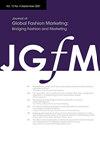被忽视的多样性统一原则:视觉商品展示概念化的整体而非单一因素方法
IF 5.5
Q2 BUSINESS
引用次数: 4
摘要
虽然零售商不能强调这样一个事实,即在现实中,各种商店设计线索结合起来构成商品的视觉展示(VMD),但产品展示研究主要集中在调查单一零售展示线索对消费者产品评价的影响。但是,在产品展示研究中,“品种统一”是一个被忽视的原则吗?学者们越来越多地建议进行更系统的研究,以确定塑造产品展示的关键商店线索的组合,从而更符合零售实践的探索性研究。作为回应,本文回顾了相关文献,并组织了研究结果,提出了一种可以全面捕获VMD结构的VMD线索的定性类型学。提出的类型学随后在两项研究中得到证实。所确定的VMD线索被分为五个关键的VMD元素类别(因素),包括显示装置、材料、组织、分期技术和照明,所有因素都装载在一个高阶VMD结构上。本文章由计算机程序翻译,如有差异,请以英文原文为准。
The neglected unity-in-variety principle: A holistic rather than a single-factor approach in conceptualising a visual merchandise display
ABSTRACT While retailers cannot stress enough the fact that, in reality, a variety of store design cues combine to make a merchandise’s visual display (VMD), the product presentation research focuses mostly on investigating the effect of a single retail display cue, at a time, on consumer product evaluations. But, is “unity-in-variety” a neglected principle in the product presentation research? Scholars are increasingly suggesting more systematic study to identify combinations of key store cues that shape a product’s display for more pertinent for the retailing practice exploratory research. In response, the present article reviews the relevant literature and organises the findings to propose a qualitative typology of VMD cues that can capture, holistically, the VMD construct. The proposed typology is then confirmed in two studies. The identified VMD cues are classified into five key VMD element categories (factors) comprising display fixtures, materials, organisation, staging technique and lighting, and all factors load on one higher-order VMD construct.
求助全文
通过发布文献求助,成功后即可免费获取论文全文。
去求助
来源期刊

Journal of Global Fashion Marketing
BUSINESS-
CiteScore
6.90
自引率
31.60%
发文量
34
期刊介绍:
The Journal of Global Fashion Marketing is a quarterly journal that publishes peer-reviewed conceptual and empirical papers and business cases of original works that significantly contribute to the overall advancement of marketing theory, research, and practice in fashion, design, and culture. JGFM endeavors to be a “global bridge” connecting marketing scholars and practitioners in fashion, design, and culture throughout the world. We publish high-quality scholarly articles on marketing written by contributors representing the leading academic authors. As we state on the cover of every issue, our positioning statement, our value added to the marketing scholar readership, is truly to “Bridge Fashion and Marketing” 1. Monitor and analyze global fashion marketing trends. 2. Generate and integrate new ideas and theories related to fashion, luxury, and culture marketing theory and practice. 3. Apply new research methods and techniques in fashion, luxury, and culture marketing. 4. Explore and disseminate cutting edge fashion marketing practices. JGFM welcomes manuscripts that provide fresh, innovative insight to any topic in the field of fashion, luxury, and culture marketing. Both conceptual and empirical works are valued, so long as the manuscript addresses substantive issues in marketing.
 求助内容:
求助内容: 应助结果提醒方式:
应助结果提醒方式:


